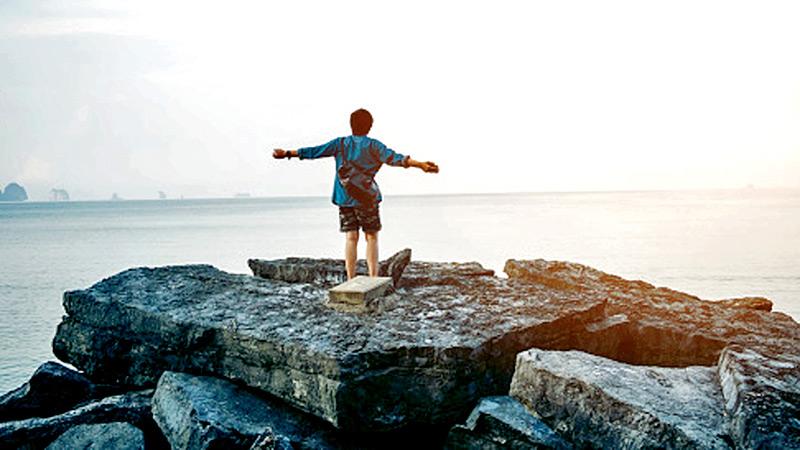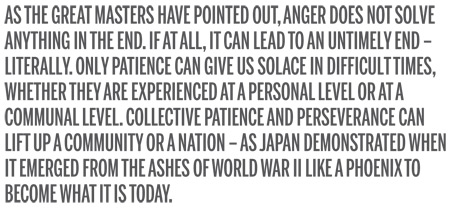
 “Patience is bitter, but its fruit is sweet.” - Jean-Jacques Rousseau
“Patience is bitter, but its fruit is sweet.” - Jean-Jacques Rousseau
Good things come (or happen) to those who wait – this is an axiom that we hear often. Patience is defined in most dictionaries as the ability to bear provocation, annoyance, misfortune, or pain, without complaint, loss of temper, irritation, or the like. It is indeed a virtue that is rare in today’s commercialised, rat race society because people are always in a hurry, sometimes for no apparent reason.
But patience always pays or wins in the end. It can save lives too. We have all seen how people who go too fast end up dead. If you do not have the patience to stop at an amber or even red light and go through, chances are that your vehicle will collide with a vehicle coming from the other side (which should have turned green).
If you suddenly lose patience while having an argument with another person, the consequences could be fatal for one of you. If you board a crowded bus because you are late for work, you may fall off the footboard and never have the opportunity to go to work again or even see your family. Patience is a choice – and always a sane one.
Covid-19 pandemic
 Nothing in recent times tested our collective patience than the Covid-19 pandemic. This unseen pathogen totally upended our lives and made us scared. We had to spend nearly two years trapped inside our houses – and some would say our minds – unable to maintain normal human interactions except via Zoom. Many people lost their patience and some, their minds, as the pandemic tightened its noose around our lives. We are still emerging from its shadow. Here again, those who tolerated its many effects have coped far better than others who gave up in the face of Covid.
Nothing in recent times tested our collective patience than the Covid-19 pandemic. This unseen pathogen totally upended our lives and made us scared. We had to spend nearly two years trapped inside our houses – and some would say our minds – unable to maintain normal human interactions except via Zoom. Many people lost their patience and some, their minds, as the pandemic tightened its noose around our lives. We are still emerging from its shadow. Here again, those who tolerated its many effects have coped far better than others who gave up in the face of Covid.
We live in difficult times. There is a war going on in Ukraine where civilians are suffering untold hardships. Yet, scanning the footage on TV of many people bearing it all up and calmly waiting to be processed at centres set up to welcome those feeling Ukraine in Poland, Romania and Moldova one gets the feeling that these people exhibit an extraordinary extent of patience even under the enormous pressures they are facing. War is never easy – we have gone through one ourselves – and it is patience that saw us through. Defeat – in more ways than one – is the only option for those who do not have the patience to stomach the horrors of war.
Challenging times
Locally too, these are challenging times. The economic circumstances created mainly by the pandemic have led to many difficulties for the public. Many people have lost their ‘cool’ while staying in queues for example. But it is worth remembering that these are temporary phenomena. There will come a time when things get moving again. There is nothing to be gained by getting worked up unnecessarily. We have been in bigger predicaments before as a Nation and collective patience always saw us through.
All the leading religions in the world teach us about the value and importance of patience. The Buddha advised his followers to look at things dispassionately and objectively, so that both losses and gains can be borne with equal composure. According to the Dhammapada Verse 184, “the best moral practice is patience”. As for the Bible, Proverbs 14:29 notes that “Whoever is patient has great understanding, but one who is quick-tempered displays folly”. The Holy Quran too has plenty of quotes on patience – “Only those who are steadfast in patience, only those who are blessed with great righteousness, will attain goodness” ( 41:35). The Bhagavad Gita, in Chapter 4, Text 38 says: “Patience is humility, not apathy”.
Finding solace
As the Great Masters have pointed out, anger does not solve anything in the end. If at all, it can lead to an untimely end – literally.
Only patience can give us solace in difficult times, whether they are experienced at a personal level or at a communal level. Collective patience and perseverance can lift up a community or a nation – as Japan demonstrated when it emerged from the ashes of World War II like a phoenix to become what it is today.
It is generally known that those who practically follow religious tenets and edicts have a calm demeanour and are able to withstand any provocative incidents or words. One reason for the loss of virtues such as patience in our society is the fact that we have veered away from religious teachings and tenets. It is not too late to rediscover how religion can turn us into more patient beings. Like with everything else, we should catch them young – it is easy to inculcate values such as patience in younger individuals who have no preconceived notions on the vicissitudes of life. Religious leaders, parents and teachers have a major role to play in this regard.
Innate quality
Patience can be an innate quality in some individuals, but it can also be practised by everyone. Meditation is a well-established path for practising patience and tolerance, regardless of one’s faith or religion.
There are many forms of religious and non-religious meditation and if you are tech-savvy, there are several smartphone meditation apps that will help in this quest.
Meditation is likely to make you a mellower person who does not get angry even under dire circumstances.
Research also suggests that some common expressions regarding anger are actually true – for example, “a hungry man is an angry man”. Again, this is all about being composed and contended, as seen in a meditating individual.
Indeed, hunger, illness and other controllable and uncontrollable factors can make us angry.
It is advisable to rein in those factors that we can control to achieve patience. That way, we can become better persons who respect others’ views, bear up the harsh realities of life and make a bigger contribution to society.
“Patience and perseverance have a magical effect before which difficulties disappear and obstacles vanish.” - John Quincy Adams
